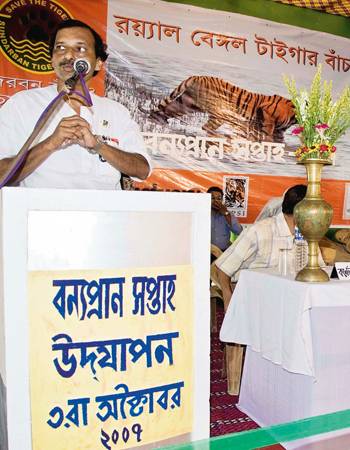Sukumar Paira
Green Teacher Award (2007)
Sukumar Paira He lives in tiger country. He nurtures young minds. He is the Headmaster of the Bijoynagar Adarsha Vidyamandir (BAV) located on an island called Bali, in the Sundarbans, in West Bengal. Distressed by the deteriorating relationship between people and the tigers of the Sundarbans, he started the Bali Wildlife Conservation Society way back in 1999 and has since been working variously with officials of the Sundarbans Tiger Reserve, the Wildlife Protection Society of India, WWF India and others to secure the future of wildlife. But, his real passion lies in working with children. A lot of children. In 2002, he started a nature club on Bali island with just seven kids. This grew to 26 nature clubs, with over 2,500 children studying in 20 schools. As many as 50 teachers work with Paira. What is more, he has even reached out to families of poachers to convince them to protect the tiger. Educator, writer, poet, social activist, environmentalist, women’s rights advocate – and tiger defender, Sukumar Paira is a man with a mission. He wants to make this world a better place. He has spent a greater part of his life teaching and inspiring students to explore and fall in love with nature. A graduate in English literature and post-graduate in Bengali, he joined the BAV school in 1977 and has since transformed it into the only higher secondary school on Bali island. He believes that the well being of the people of Bali depends on how well they look after their ecological assets. He also believes that the benefits from the core area of the Sundarbans Tiger Reserve, including fish and honey can best be tapped outside the reserve. This is why he works with kids to convince their parents not to poach animals, and not to take either wood or fish from the inner core of the park. He is the author of Atanu Smarak Sankalan, a book that documents the cultural heritage of the Sundarbans. He exemplifies the “act locally, think globally” concept on which the Bali Nature and WildLife Conservation Society is founded. Seminars, workshops and teachers’ training programmes are par for the course for this incredibly productive and valuable human being, who considers preaching anti-poaching doctrines, the cultivation of medicinal plant gardens and lectures on the dangers of plastics a part-and-parcel of his education mission. Aware of the power of ecotourism to bring both revenue and respect to the communities he serves, he has thrown his lot in with HELP Tourism (see Sanctuary Vol. XXVII No. 4, August 2007) and is a hugely positive influence not only on locals but on hundreds of visitors to the swamps he calls home. He is a green teacher in every sense of the word, and is an example that teachers across the country would do well to emulate.


